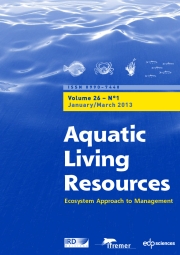Crossref Citations
This article has been cited by the following publications. This list is generated based on data provided by
Crossref.
Speckman, Suzann G.
Piatt, John F.
Minte-Vera, Carolina V.
and
Parrish, Julia K.
2005.
Parallel structure among environmental gradients and three trophic levels in a subarctic estuary.
Progress in Oceanography,
Vol. 66,
Issue. 1,
p.
25.
TANOUE, Hideaki
HAMANO, Akira
KOMATSU, Teruhisa
and
BOISNIER, Etienne
2008.
Assessing bottom structure influence on fish abundance in a marine hill by using conjointly acoustic survey and geographic information system.
Fisheries Science,
Vol. 74,
Issue. 3,
p.
469.
Kracker, Laura
Kendall, Matt
and
McFall, Greg
2008.
Benthic Features as a Determinant for Fish Biomass in Gray's Reef National Marine Sanctuary.
Marine Geodesy,
Vol. 31,
Issue. 4,
p.
267.
Molinero, J. C.
Vukanič, V.
Lučić, D.
Ibanez, F.
Nival, P.
Licandro, P.
Calbet, A.
Christou, E. D.
Daly-Yahia, N.
Fernandez de Puelles, M. L.
Mazzocchi, M. G.
and
Siokou-Frangou, I.
2009.
Mediterranean marine copepods: basin-scale trends of the calanoid Centropages typicus.
Hydrobiologia,
Vol. 617,
Issue. 1,
p.
41.
Javidpour, Jamileh
Molinero, Juan Carlos
Peschutter, Jesco
and
Sommer, Ulrich
2009.
Seasonal changes and population dynamics of the ctenophore Mnemiopsis leidyi after its first year of invasion in the Kiel Fjord, Western Baltic Sea.
Biological Invasions,
Vol. 11,
Issue. 4,
p.
873.
WANG, Ke
DUAN, Xin-Bin
LIU, Shao-Ping
LI, Zhi-Hua
and
CHEN, Da-Qing
2009.
SURVEY ON TEMPORAL AND SPATIAL DISTRIBUTION OF FISH IN THE DANING RIVER.
Acta Hydrobiologica Sinica,
Vol. 33,
Issue. 3,
p.
516.
Manjarrés-Martínez, Luis M.
Gutiérrez-Estrada, Juan Carlos
Mazenet-González, Julio
and
Soriguer, Milagrosa C.
2010.
Seasonal patterns of three fish species in a Caribbean coastal gill-net fishery: Biologically induced or climate-related aggregations?.
Fisheries Research,
Vol. 106,
Issue. 3,
p.
358.
Trenkel, VM
Ressler, PH
Jech, M
Giannoulaki, M
and
Taylor, C
2011.
Underwater acoustics for ecosystem-based management: state of the science and proposals for ecosystem indicators.
Marine Ecology Progress Series,
Vol. 442,
Issue. ,
p.
285.
Bezerra-Neto, José Fernandes
Brighenti, Ludmila Silva
Mello, Nelson Azevedo Santos Teixeira de
and
Pinto-Coelho, Ricardo Motta
2012.
Hydroacoustic assessment of fish and Chaoborus (Diptera-Chaoboridae) distribution in three Neotropical lakes.
Acta Limnologica Brasiliensia,
Vol. 24,
Issue. 1,
p.
18.
Paramo, Jorge
Wolff, Matthias
and
Saint-Paul, Ulrich
2012.
Deep-sea fish assemblages in the Colombian Caribbean Sea.
Fisheries Research,
Vol. 125-126,
Issue. ,
p.
87.
Paramo, Jorge
and
Saint-Paul, Ulrich
2012.
Spatial structure of the Caribbean lobster (Metanephrops binghami) in the Colombian Caribbean Sea.
Helgoland Marine Research,
Vol. 66,
Issue. 1,
p.
25.
Paramo, Jorge
and
Saint-Paul, Ulrich
2012.
Deep-sea shrimpsAristaeomorpha foliaceaandPleoticus robustus(Crustacea: Penaeoidea) in the Colombian Caribbean Sea as a new potential fishing resource.
Journal of the Marine Biological Association of the United Kingdom,
Vol. 92,
Issue. 4,
p.
811.
Sun, M.
Chen, D.
Wang, K.
Duan, X.
Luo, H.
and
Zhu, Z.
2013.
Hydroacoustic surveys on temporal and spatial distribution of fishes in the section from Chenglingji to Yichang of the Yangtze River middle reaches.
Journal of Applied Ichthyology,
Vol. 29,
Issue. 6,
p.
1459.
Bezerra-Neto, José Fernandes
Brighenti, Ludmila Silva
and
Pinto-Coelho, Ricardo Motta
2013.
Implementation of hydroacoustic for a rapid assessment of fish spatial distribution at a Brazilian Lake - Lagoa Santa, MG.
Acta Limnologica Brasiliensia,
Vol. 25,
Issue. 1,
p.
91.
Bonanno, Angelo
Giannoulaki, Marianna
Barra, Marco
Basilone, Gualtiero
Machias, Athanassios
Genovese, Simona
Goncharov, Sergey
Popov, Sergey
Rumolo, Paola
Di Bitetto, Massimiliano
Aronica, Salvatore
Patti, Bernardo
Fontana, Ignazio
Giacalone, Giovanni
Ferreri, Rosalia
Buscaino, Giuseppa
Somarakis, Stylianos
Pyrounaki, Maria-Myrto
Tsoukali, Stavroula
Mazzola, Salvatore
and
MacKenzie, Brian R.
2014.
Habitat Selection Response of Small Pelagic Fish in Different Environments. Two Examples from the Oligotrophic Mediterranean Sea.
PLoS ONE,
Vol. 9,
Issue. 7,
p.
e101498.
Rodríguez-Sánchez, Victoria
Encina-Encina, Lourdes
Rodríguez-Ruiz, Amadora
and
Sánchez-Carmona, Ramona
2015.
Horizontal target strength of Luciobarbus sp. in ex situ experiments: Testing differences by aspect angle, pulse length and beam position.
Fisheries Research,
Vol. 164,
Issue. ,
p.
214.
Jodice, PGR
Ronconi, RA
Rupp, E
Wallace, GE
and
Satgé, Y
2015.
First satellite tracks of the Endangered black-capped petrel.
Endangered Species Research,
Vol. 29,
Issue. 1,
p.
23.
De La Hoz-M, J.
Motta, J.
and
Paramo, J.
2016.
Length-weight relationships for 36 deep-sea fish in the Colombian Caribbean Sea.
Journal of Applied Ichthyology,
Vol. 32,
Issue. 6,
p.
1356.
Bonanno, A.
Barra, M.
Basilone, G.
Genovese, S.
Rumolo, P.
Goncharov, S.
Popov, S.
Buongiorno Nardelli, B.
Iudicone, D.
Procaccini, G.
Aronica, S.
Patti, B.
Giacalone, G.
Ferreri, R.
Fontana, I.
Tranchida, G.
Mangano, S.
Pulizzi, M.
Gargano, A.
Di Maria, A.
and
Mazzola, S.
2016.
Environmental processes driving anchovy and sardine distribution in a highly variable environment: the role of the coastal structure and riverine input.
Fisheries Oceanography,
Vol. 25,
Issue. 5,
p.
471.
Parker-Stetter, Sandra
Urmy, Samuel
Horne, John
Eisner, Lisa
and
Farley, Edward
2016.
Factors affecting summer distributions of Bering Sea forage fish species: Assessing competing hypotheses.
Deep Sea Research Part II: Topical Studies in Oceanography,
Vol. 134,
Issue. ,
p.
255.


